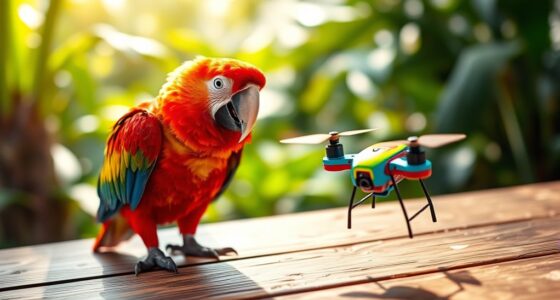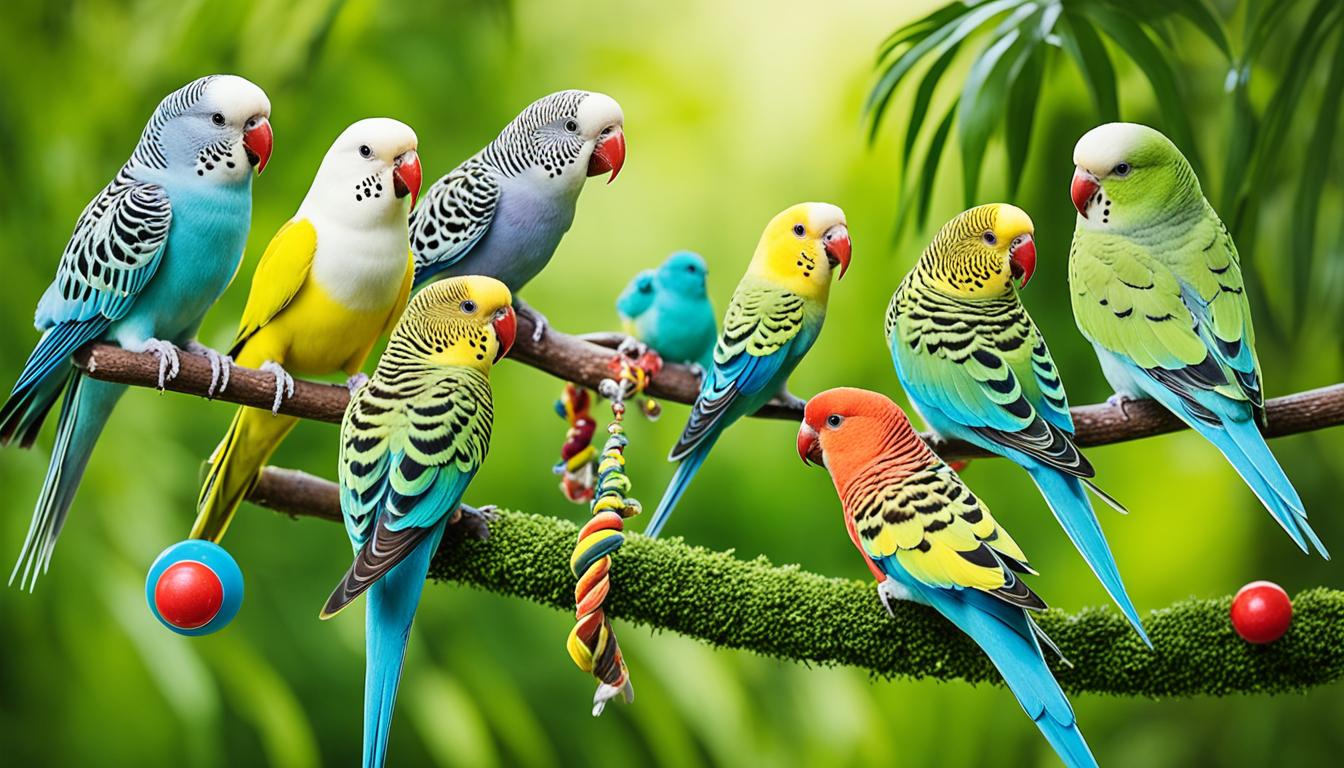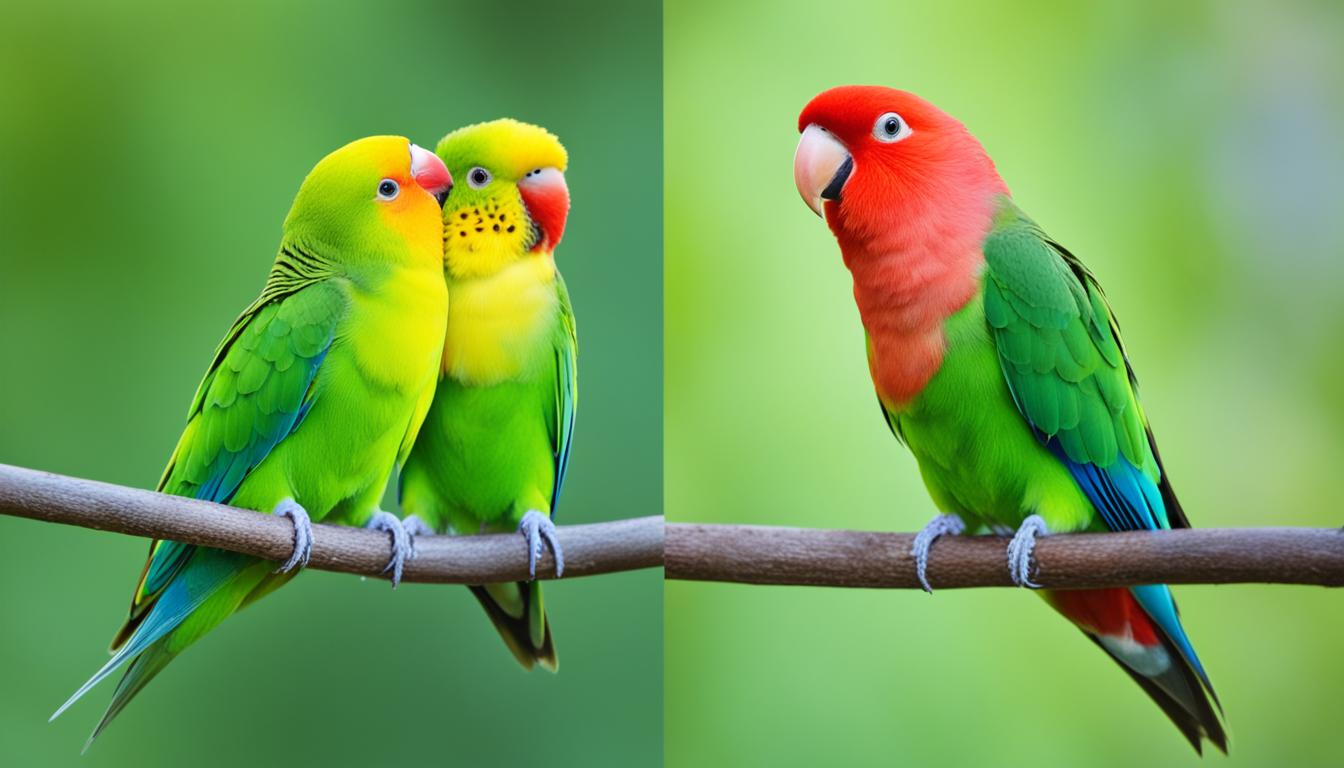To give your pet bird a balanced diet, include high-quality pellets as the base, ensuring they get essential nutrients. Add a variety of fresh fruits and vegetables like kale, berries, and carrots to provide vitamins and stimulate natural foraging. Offer occasional protein sources such as cooked eggs or lean meat, and remember to provide fresh water daily. If you want to discover more tips on keeping your bird healthy, there’s much more to learn.
Key Takeaways
- Provide high-quality, species-specific pellet mixes as the dietary foundation for balanced nutrition.
- Supplement with fresh, safe fruits and vegetables like kale, carrots, and berries for variety and vital nutrients.
- Offer occasional protein sources such as cooked eggs or lean meats, and limit seed consumption to treats.
- Ensure constant access to fresh, clean water to support hydration and overall health.
- Avoid toxic or processed foods, and consult an avian veterinarian for personalized dietary guidance.

Feeding your pet bird properly is essential for its health and happiness. A well-balanced diet ensures your feathered friend stays energetic, avoids health issues, and lives a long, vibrant life. When it comes to bird nutrition, understanding what to include and what to avoid is key. Providing safe food options not only keeps your bird happy but also helps prevent illnesses caused by poor diet choices.
Start with a high-quality pellet mix designed specifically for your bird’s species. Pellets are formulated to include essential nutrients, vitamins, and minerals that mimic their natural diet. They serve as the foundation of good bird nutrition, offering a balanced blend of proteins, carbohydrates, and fats. However, pellets shouldn’t be the sole component of your bird’s diet. Supplementing with fresh fruits and vegetables adds variety and vital nutrients that pellets may lack. Safe food options include leafy greens like kale or spinach, colorful bell peppers, carrots, and berries. Always wash produce thoroughly to remove pesticides and contaminants before offering them to your bird.
Begin with species-specific pellets, then add fresh fruits and vegetables for a balanced diet.
Fresh fruits and vegetables not only diversify your bird’s diet but also stimulate their natural foraging instincts. Avoid giving your bird avocado, onion, garlic, or citrus fruits like lemon and orange, as these can be toxic. Never feed your bird processed foods, salty snacks, or sugary treats, which can cause health issues such as obesity or digestive problems. Stick to natural, unprocessed foods to maintain optimal health.
In addition to fruits and vegetables, occasional protein sources like cooked eggs or small amounts of cooked lean meat can be beneficial. Seeds, while popular, should be offered sparingly because they are high in fat and can lead to nutritional imbalance if relied upon exclusively. Instead, use seeds as treats or supplements rather than the main diet. Incorporating nutritional balance into your bird’s diet helps ensure they receive all necessary nutrients for a thriving life. Understanding avian dietary needs is crucial for creating a diet that supports your bird’s overall well-being.
Water plays an equally critical role. Always provide fresh, clean water daily to keep your bird hydrated. Proper hydration supports digestion and overall health. Remember, variety is crucial, but moderation and safety come first. Avoid any foods that aren’t specifically recommended for birds, and consult with an avian veterinarian for tailored advice. By choosing safe food options and prioritizing bird nutrition, you’re giving your pet the best chance at a healthy, happy life. Proper diet management isn’t complicated — it’s about consistently offering nutritious, safe foods that meet your bird’s natural needs.
Frequently Asked Questions
How Often Should I Change My Bird’S Water?
You should change your bird’s water daily to guarantee ideal bird hydration and maintain water freshness. Fresh water encourages your bird to drink more and prevents bacteria buildup, which can harm their health. Regularly revitalizing the water also helps you spot any debris or contamination quickly. By keeping water fresh and changing it every day, you support your bird’s well-being and promote a healthy, happy pet.
Are Wild Bird Foods Suitable for Pet Birds?
Imagine a vibrant mix of seeds and fruits spilling over your hand—wild bird foods seem tempting, but they often differ nutritionally from your pet’s needs. While they offer variety, wild bird foods may lack essential nutrients or contain fillers that aren’t ideal for your bird. Always check for nutritional differences and consult your vet before offering these foods, ensuring your pet gets a balanced, healthy diet tailored to its needs.
Can I Give My Bird Human Snacks?
You shouldn’t give your bird human snacks because many aren’t safe for them. Human snack safety varies, and some foods can be toxic or cause health issues. Instead, focus on ensuring bird diet diversity with safe, nutritious options designed for birds. Always check which human foods are safe before offering them, and consult your vet. This keeps your pet healthy and happy, while avoiding unnecessary risks.
What Are Signs of a Poor Diet in My Bird?
Think of your bird’s health as a delicate house of cards. If it’s unstable, you’ll notice signs of a poor diet. Look for diet deficiencies like feather plucking, weight loss, or lethargy. Behavioral changes, such as increased aggression or vocalization, also signal nutritional issues. Keep an eye on these signs, and guarantee your bird’s diet is balanced to maintain its vibrant, happy life.
How Do I Introduce New Foods Safely?
When introducing new foods, you want to guarantee safe food transitions for your bird. Start slowly by offering small amounts alongside familiar foods, and watch for any signs of adverse reactions. Gradually increase the variety over time, giving your bird a chance to adjust comfortably. This approach helps prevent digestive upset and encourages acceptance of new, healthy options, making the process smooth and safe for your feathered friend.
Conclusion
Feeding your pet bird is like nurturing a delicate flower—you need to give it the right nutrients to help it thrive. By offering a variety of seeds, fresh fruits, vegetables, and occasional treats, you guarantee your feathered friend stays healthy and happy. Remember, a balanced diet is the foundation of a long, joyful life together. With love and careful attention, you’ll watch your bird flourish like a bright, beautiful sunrise.










